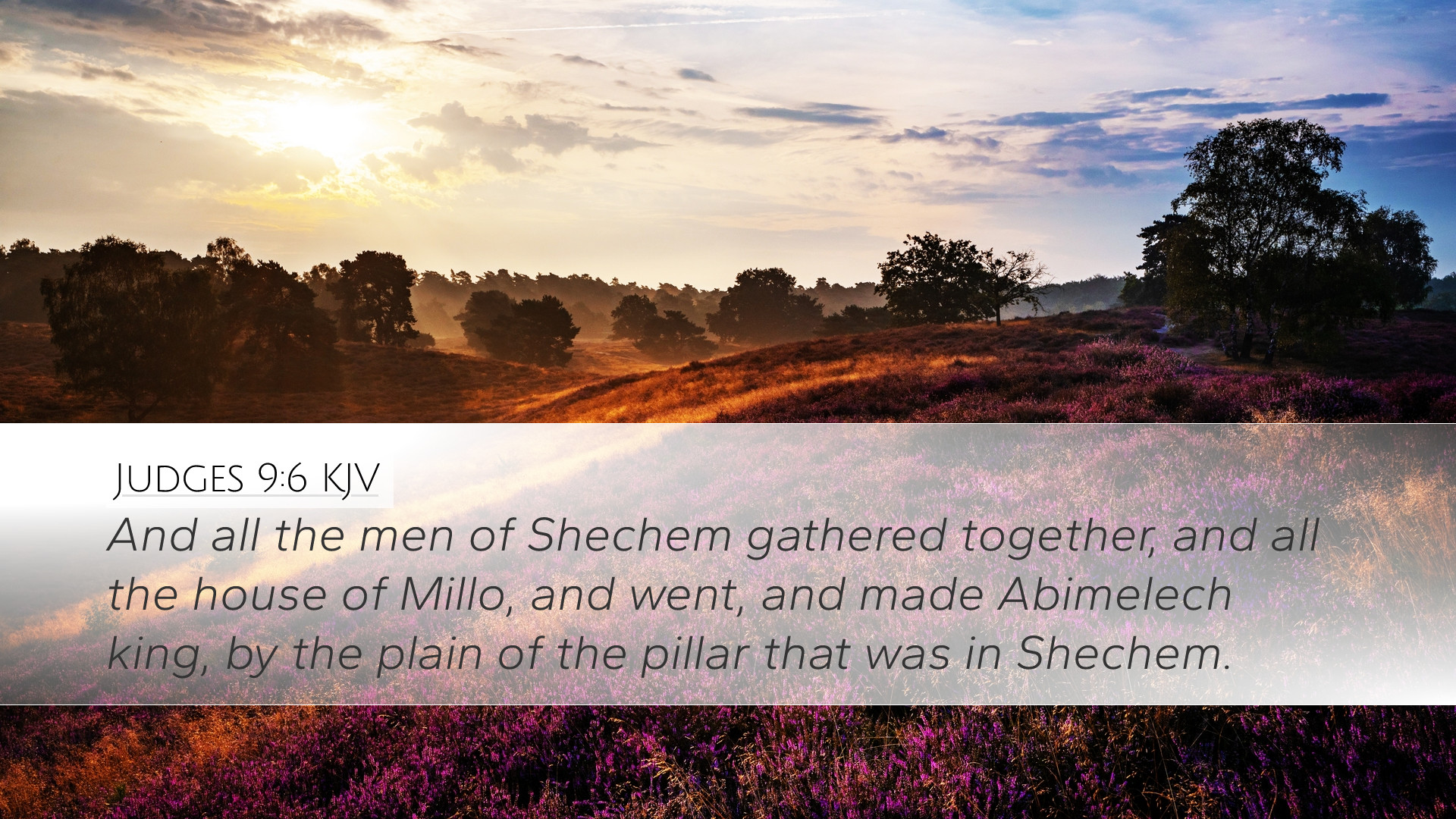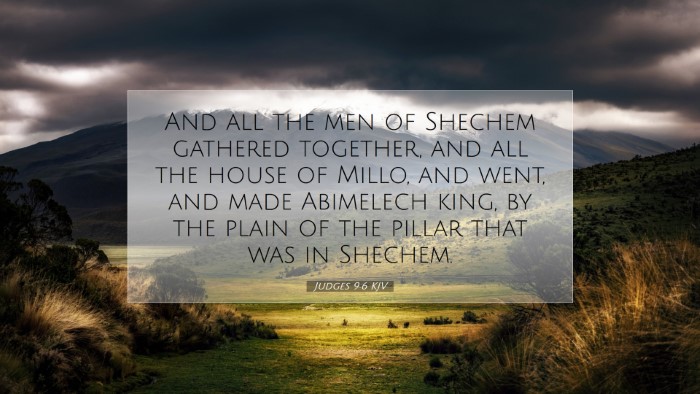Commentary on Judges 9:6
Judges 9:6 is a pivotal moment in the narrative of the Book of Judges, marking the rise of Abimelech as a self-proclaimed king of Shechem. This verse states: "And all the men of Shechem gathered together, and all the house of Millo, and went, and made Abimelech king, by the oak of the pillar that was in Shechem." In this commentary, we will explore various insights drawn from public domain sources, delving into the implications of this act, the characters involved, and the theological underpinnings of the events that unfolded.
Contextual Background
The Book of Judges illustrates a period of Israel's history characterized by cycles of sin, oppression, and deliverance. Following the death of Gideon, Israel faced a leadership vacuum. It is in this context that Abimelech, one of Gideon’s sons, attempts to establish his rule, reflecting the human inclination towards power and authority, often leading to profound moral and social implications.
Analysis of Key Characters
Abimelech
Abimelech, as the son of Gideon (also known as Jerubbaal), represents a departure from the typical judges raised by God. Unlike his father, who led with divine sanction, Abimelech's approach is marked by ambition and cunning. Albert Barnes reflects on Abimelech's character, noting that his desire for kingship stems not from a covenant relationship with God but from an aspiration for personal power. This illustrates a significant theme in Judges—the tension between divinely appointed leaders and self-appointed rulers.
The Men of Shechem
The citizens of Shechem play a critical role in Abimelech’s rise. Their decision to make him king signals a collective rejection of the theocratic principles established by God as articulated through the leadership of judges. Matthew Henry emphasizes their lack of discernment, showcasing how the desire for a strong leader can overshadow the need for righteousness and divine guidance. Their actions raise questions about loyalty, governance, and the characteristics of leadership in a society that has drifted from God’s commandments.
The Significance of the Oak
The location of Abimelech's coronation—the oak near the pillar at Shechem—holds historical and theological significance. Strong associations with sacred oaks are found throughout scripture, representing places of divine encounter and covenant. Adam Clarke notes that this choice of location may indicate a deliberate intertwining of political aspirations with religious symbolism, albeit misinterpreted. It is essential to recognize how physical geography in the Bible often carries deeper spiritual truths, reflecting God’s covenantal promises with Israel. The oak becomes not just a backdrop but a symbol of the misguided attempts to merge earthly ambition with divine purpose.
The Rise of Monarchy
Abimelech's ascension marks a significant turn toward monarchical governance in Israel, contrasting sharply with the established model of judges. The theological implications of this shift underscore a rejection of divine kingship in favor of human autonomy. Henry articulates that Israel’s demand for a king, as later seen in 1 Samuel, is rooted in a desire to be like other nations—a representation of spiritual blindness that leads to painful consequences.
Rejection of God's Kingdom
In making Abimelech king, the people of Shechem symbolically reject God's rule over Israel. This event foreshadows the struggles that Israel will face under human kingship—a recurring theme of apostasy and its repercussions throughout scripture. The decision reflects a fundamental misunderstanding of godly leadership, which is characterized by service and sacrifice rather than dominion and control.
Theological Reflections
Judges 9:6 offers rich material for theological reflection regarding leadership, authority, and the nature of God’s sovereignty. The choices made by both Abimelech and the men of Shechem invite modern readers to consider the implications of their own leadership styles and the spiritual climates in which they operate. As pastors, students, and theologians reflect on these themes, it becomes apparent that God continues to call His people to recognize His authority over all aspects of life, rejecting the allure of self-made paths to power.
Divine vs. Human Authority
The contrast between divine authority and human authority is foundational to understanding the narrative of Judges. In this verse, we see humanity's tendency to seek control through their means rather than submitting to God’s sovereign plan. Clarke states that this act of appointing Abimelech serves as a cautionary tale, reminding leaders of their accountability to God’s greater purpose and the potential spiritual hazards of ambition devoid of righteousness.
The Role of Community in Leadership Choices
The collective decision of the men of Shechem emphasizes the critical role communities play in leadership choices. Their eagerness to crown Abimelech indicates a communal desire for stability and strength, yet it highlights the need for discernment in leadership selection. Here, Henry cautions against blindly following charismatic leaders without evaluating their alignment with God’s will. This serves as a vital principle for contemporary church governance and community leadership.
Conclusion
Judges 9:6 encapsulates a moment of both human ambition and profound spiritual consequence. The actions of Abimelech and the men of Shechem usher in a new chapter in Israel’s history—one marked by the tension between human authority and the ultimate kingship of God. The insights gathered from public domain commentaries provide a multifaceted understanding of this passage, prompting reflection on the nature of leadership, the significance of communal decisions, and the ever-present call to recognize the authority of God in all spheres of life. As modern readers engage with this text, they are invited to explore the implications of their own leadership roles and the collective journey of faith within their communities.


